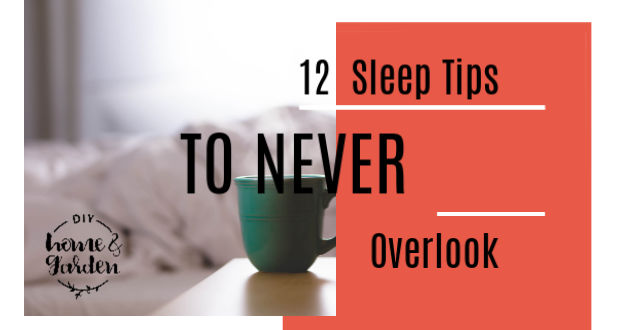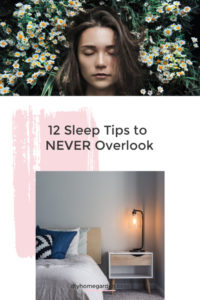
12 SLEEP TIPS TO NEVER OVERLOOK

1 – Get more daylight
Increase your exposure to bright light during the day. Your body keeps time itself naturally with what is known as your circadian rhythm. This clock tells you when to stay awake and when it’s time for sleep. Exposure to sunlight or bright light during the day keeps your circadian rhythm on track, helping you fall asleep easier.
2 – Cut the blue light
Reduce your exposure to blue light before you head off to bed. Exposure to light at night confuses your circadian rhythm, making it harder to sleep. Your brain thinks it is still daytime, so it reduces hormones like melatonin which helps you to relax and rest deeply. Blue light, which is emitted in large amounts by devices like smartphones, is the worst for this. Turn off devices at night, and put down the screens for an hour or two before bedtime.
3 – Rethink your afternoon java
Reduce caffeine intake late in the day. When consumed too late in the day, caffeine stimulates your nervous system, which stops you from sleeping as easily. Caffeine can stay in your blood for almost eight hours, so try to avoid it after around 4pm, especially if you’re sensitive to it. Switch to decaf in the evenings.
4 – No naptime for better nighttime sleep
Reduce naps during the day. A short power nap can be a good thing, but if you’re taking long or irregular naps during the day, this could have an impact on your slumber quality. Being asleep during the day can confuse your internal clock. If you find napping makes you sleep worse, cut them out. If, however, you still sleep well at night, a nap is perfectly healthy.
5 – Set a schedule
Try to go to bed and wake up at consistent times. Your body’s circadian rhythm works on a loop, aligned with the sunrise and sunset. By sleeping and waking at the same time every day, you can aid your sleep quality. Try to go to bed at the same sort of time every night, and get up even if you don’t have anywhere to be, so you stay on a schedule.
6 – Add some weight
Invest in a Corala blanket from https://www.coralablanket.com/. These weighted blankets are designed to swaddle you as you rest, making you feel very relaxed. As you relax, you’re more likely to drift off to sleep and sleep more deeply.
7 – Take melatonin
Take a melatonin supplement. Melatonin is a key sleep hormone to tell your brain when to fall asleep. A melatonin supplement can be used to treat insomnia and help you fall asleep faster, making you feel more energized the next day. You may need a prescription for this, so speak to your doctor before taking anything.
8 – Nutritional supplements
If melatonin doesn’t work, try another supplement. Ginkgo biloba, glycine, valerian root, magnesium and lavender could all help. Only use one supplement at once, and be sure to ask your GP about any supplements you’d like to try.
9 – Avoid alcoholic beverages
Don’t drink alcohol. You might fall asleep easier after a few beers, but alcohol actually means you won’t rest as well. Alcohol causes and can increase symptoms like sleep apnea, snoring or disrupted sleep patterns. Alcohol also alters your melatonin production, meaning your body’s natural rhythms will be altered.
10 – Optimize your bedroom for sleep
Prep your bedroom ready for sleep. Having your bedroom aimed at creating the optimum sleep environment can help you doze off faster. Temperature, noise, lights and even the arrangement of your furniture can change the way you sleep.
Try to minimize the amount of external noise that reaches your room. Hang blackout curtains to block out light from outside Inside the bedroom, remove or cover any artificial lights, like standby lights and alarm clocks.
Keep your bedroom quiet, relaxing and a great place to curl up for a long rest. Cool temperatures seem to be easier to relax in, too, so try and keep the room cool for bedtime.
11- Skip the late night eats
Don’t eat late at night. Eating too late can make your sleep less restful, as it can impact melatonin production. Eating a high-carb meal around four hours before bed can help you sleep better, but much later can mean your body is concentrating on digestion instead of sleep. For others, low-carb meals are better for sleep, so find what works for you.
12 – Establish your best sleep routine
Find a relaxing pre-bed routine. Some relaxation techniques before bed could help you battle insomnia and improve your slumber. Try a few strategies, like relaxing music, reading a book, taking a warm bath, breathing exercises or meditation.

The Bottom Line on Better Sleep
You deserve your slumber–every minute you’d like to get. These tips can help you form new habits. And that’s when you will begin to feel the results of consistent sleep.

